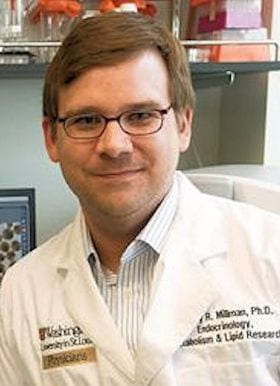
Jeffrey R. Millman, PhD
Associate Professor of Medicine and Biomedical Engineering
- Phone: 314-362-3268
- Fax: 314-362-7641
- Email: jmillman@nospam.wustl.edu
Biography
Dr. Millman received his Ph.D. in Chemical Engineering from the Massachusetts Institute of Technology in 2011, where he studied the effects of controlled oxygen exposure on stem cell differentiation with Dr. Clark Colton. He completed his postdoctoral research fellowship at Harvard University with Dr. Douglas Melton, developing methods to generate functional pancreatic insulin-producing β cells from human stem cells, and received a Harvard Stem Cell Institute Postdoctoral Fellowship. Dr. Millman joined the Department of Medicine faculty at Washington University in St. Louis in 2015.
Research Interests
The major focus of the Millman laboratory is the in vitro production and study of pancreatic insulin-producing β cells from human pluripotent stem cells for use in cellular replacement therapy and drug screening. The rapid rise in the occurrence of diabetes mellitus has garnered much attention in the development of technologies to better study and treat this disease. As diabetes is caused by the destruction or dysfunction of insulin-producing pancreatic β cells, much of this focus has been directed to the generation of human β cells in vitro, for without this capability, further advancement in disease modeling, drug screening, and transplantation are precluded.
Dr. Millman with colleagues developed a 6-step protocol for generating functional pancreatic β cells in vitro from human pluripotent stem cells. These cells, called stem cell-derived β cells (SC-β cells), have similar physiological function of adult β cells as assessed by numerous in vitro and in vivo assays. Upon transplantation, these cells rapidly reverse hyperglycemia in diabetic mice. We are able to generate these cells in highly-scalable suspension culture, producing up to half a billion cells per batch.
The Millman laboratory is investigating methods to improve the generation and function of SC-β cells, primarily by using biomedical engineering approaches to introduce and modulate microenvironmental cues that play an important role in β cell development and function. These methods are also being extended to investigate SC-β cells generated from diabetic patients using induced pluripotent stem cells (iPS cells).